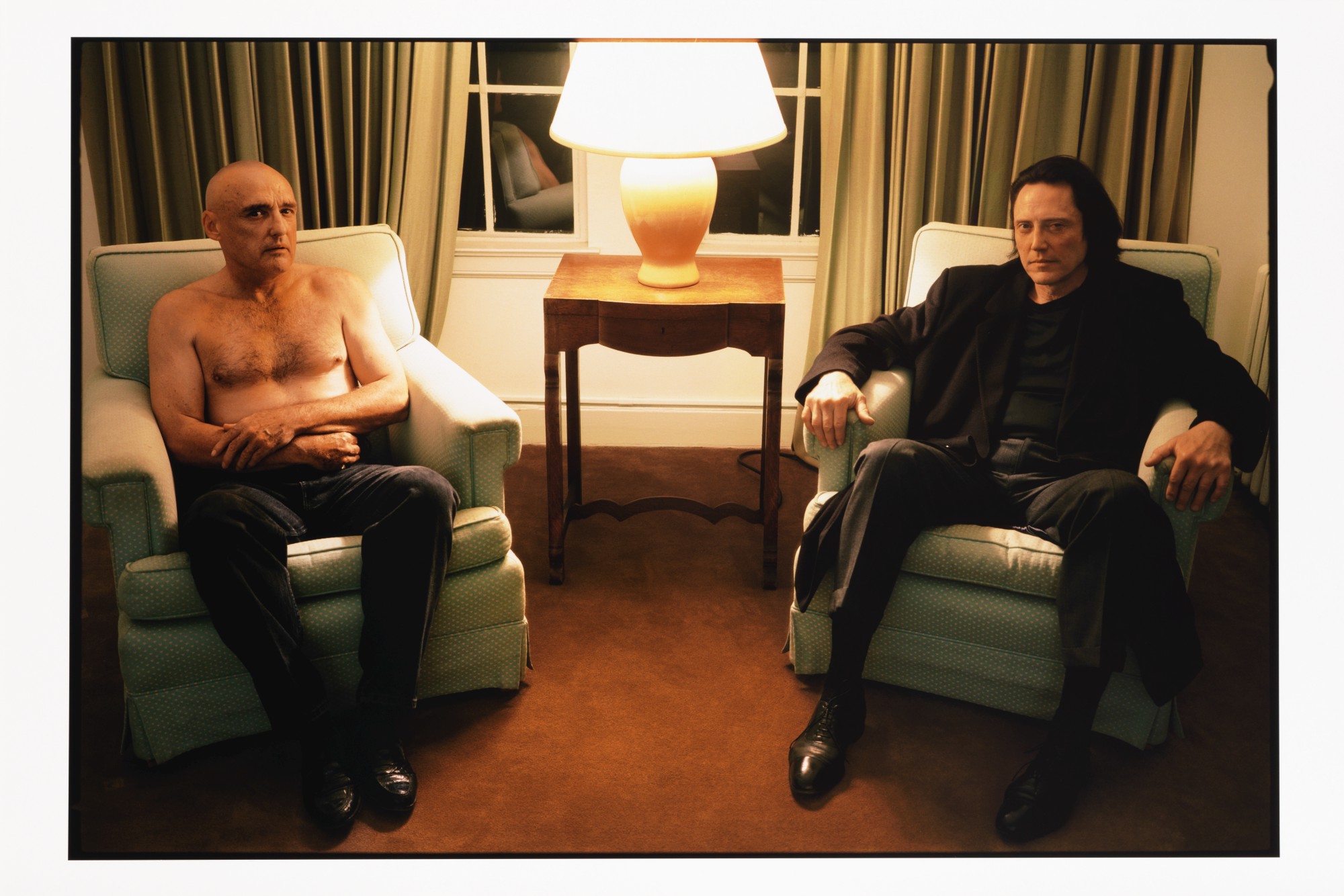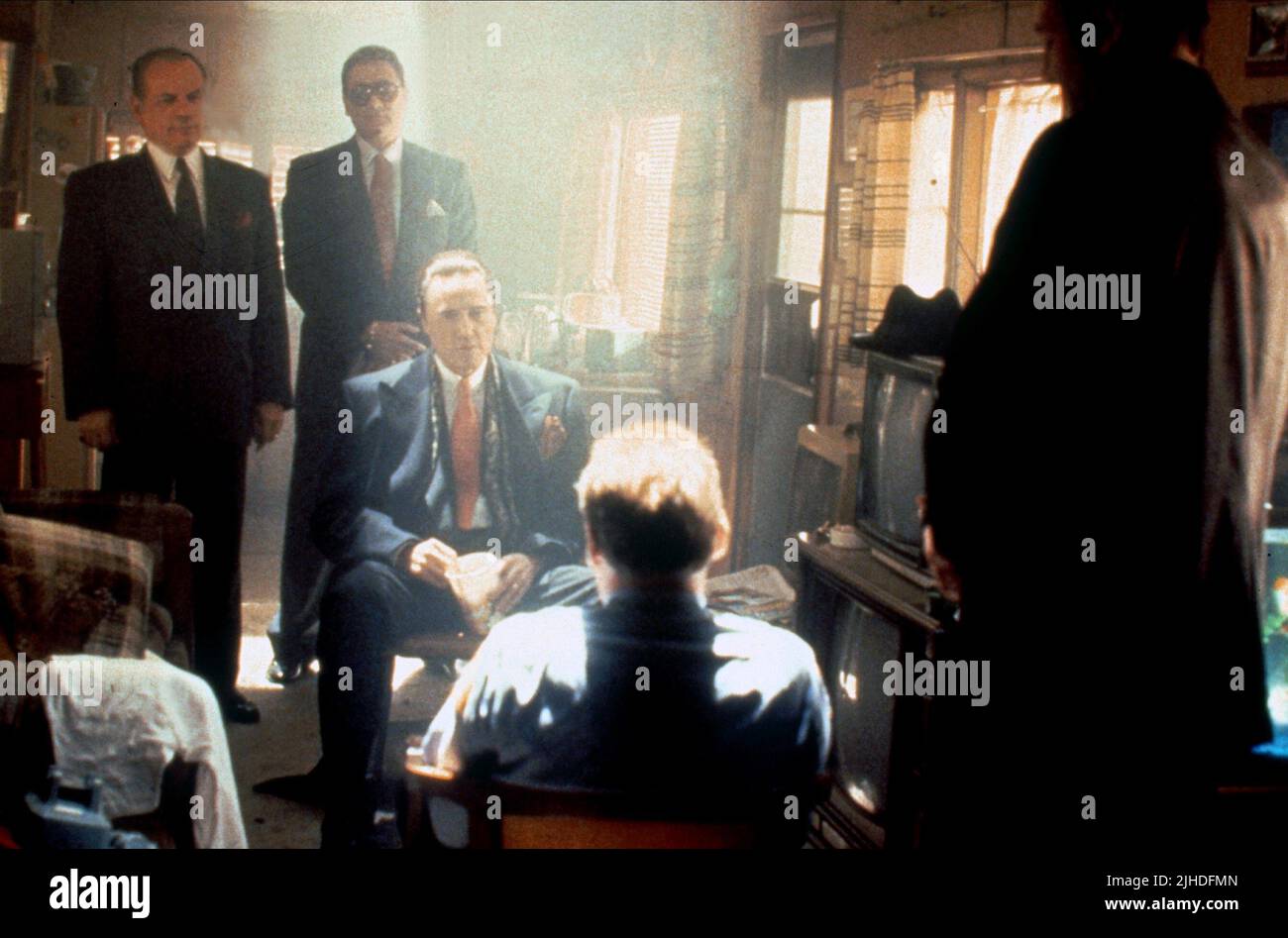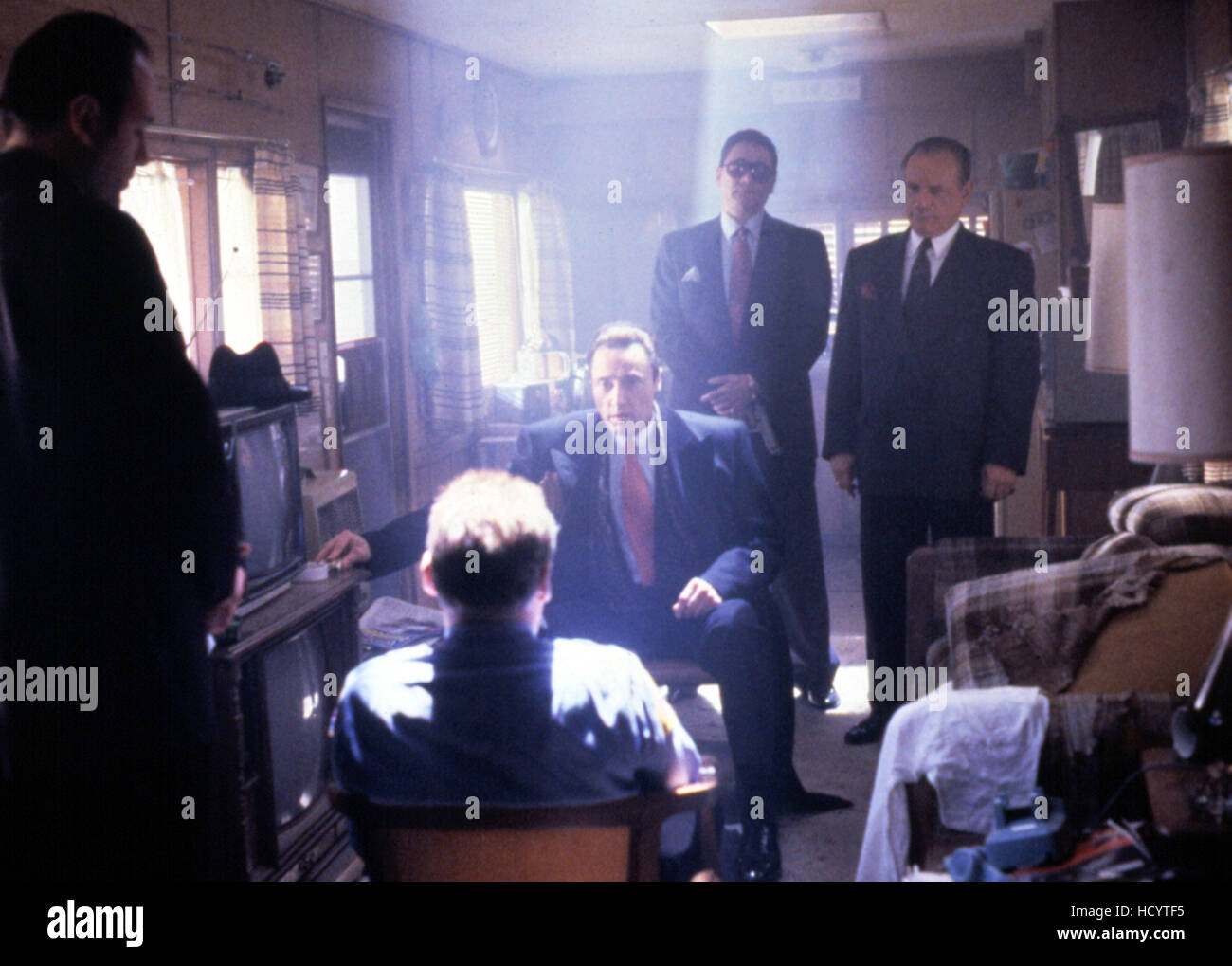The Unforgettable Showdown: Christopher Walken And Dennis Hopper In True Romance
Few movie moments stick with you quite like the intense face-off between Christopher Walken and Dennis Hopper in the 1993 film, True Romance. It's a scene that, you know, has earned its place in film history, often talked about by movie lovers and, too, by those who just appreciate really good acting. This particular part of the movie, penned by Quentin Tarantino, showcases two truly unique talents going head-to-head, creating something quite extraordinary to watch.
The film, directed by Tony Scott, is a wild ride of a romantic crime story, yet this specific interaction manages to stand out even within its fast-paced narrative. It's a moment of quiet, unsettling tension that builds and builds, apparently, without much movement, but with words that cut like knives. Many people, it seems, remember this scene above almost all others from the picture.
This article will take a closer look at what makes this scene so compelling, exploring the performances of Christopher Walken and Dennis Hopper, the sharp writing that shaped their exchange, and the lasting impact it has had on cinema. We'll, in a way, break down why it continues to captivate audiences years later.
- Billy Ray Cyrus Net Worth 2024
- How Much Is Snoop Dog Worth
- Cooper Kupp Net Worth
- Connie Nielsen Net Worth
- Alessandra Ambrosio Net Worth
Table of Contents
- The Actors: A Brief Look
- True Romance: Setting the Stage
- The Sicilian Scene: An Unforgettable Exchange
- The Impact and Legacy of the Scene
- Frequently Asked Questions
The Actors: A Brief Look
Before we get into the scene itself, it's worth understanding a little about the two actors involved. Christopher Walken and Dennis Hopper were, in some respects, forces of nature in their own right, each bringing a unique energy to the screen. Their combined presence in a single scene was always going to be something special, and, you know, it truly was.
Christopher Walken: A Glimpse at His Journey
Christopher Walken has, for a long time, been known for his distinctive voice, his unusual pauses, and his ability to play characters who are both charming and deeply unsettling. He started out in musicals and stage work, which, apparently, gave him a strong foundation in performance. His career really took off with roles that let him show off his intense screen presence, often playing memorable villains or quirky individuals. He brings a certain unpredictable quality to his parts, which, as a matter of fact, keeps audiences on the edge of their seats.
| Detail | Information |
|---|---|
| Full Name | Ronald Walken |
| Born | March 31, 1943 |
| Birthplace | Astoria, Queens, New York, USA |
| Notable Roles (examples) | Nick Chevotarevich (The Deer Hunter), Frank White (King of New York), Captain Koons (Pulp Fiction) |
| Awards (example) | Academy Award for Best Supporting Actor (The Deer Hunter) |
Dennis Hopper: A Look at His Path
Dennis Hopper was, in many ways, a true rebel of cinema. He was an actor, director, and artist who pushed boundaries throughout his career. From his early days in Hollywood to his groundbreaking work in independent film, Hopper always seemed to follow his own path. He often played characters with a raw, untamed edge, sometimes a bit wild or, you know, deeply troubled. His performances were often unpredictable and, in a way, very powerful, making him a legend in the acting world. He had a knack for making even quiet moments feel very charged.
- Ck Net Worth
- Sherri Crichton Net Worth
- Net Worth Of Brian Kilmeade
- Bill Lawrence Net Worth
- Net Worth Of David Guetta
| Detail | Information |
|---|---|
| Full Name | Dennis Lee Hopper |
| Born | May 17, 1936 |
| Died | May 29, 2010 |
| Birthplace | Dodge City, Kansas, USA |
| Notable Roles (examples) | Billy (Easy Rider), Frank Booth (Blue Velvet), Deacon (Waterworld) |
| Awards (example) | Two Academy Award nominations |
True Romance: Setting the Stage
True Romance is, basically, a love story wrapped in a very violent crime drama. It follows Clarence and Alabama, two young lovers who find themselves on the run after stealing a large amount of cocaine from a mob boss. The film is known for its quick pace, its sharp dialogue, and a cast that is, quite honestly, packed with famous faces. The story, in a way, pulls you in right from the start, taking you on a wild ride across the country.
The scene with Christopher Walken and Dennis Hopper comes at a pivotal moment. Clarence's father, Clifford Worley (played by Hopper), is questioned by Vincenzo Coccotti (played by Walken), a mob consigliere. Coccotti is trying to find Clarence and the drugs. Clifford, knowing what's at stake for his son, has to decide how much information he's willing to give up, and, you know, how far he'll go to protect his family. This setup creates a natural tension, a feeling of dread that hangs heavy in the air, even before the actors say a word.
The setting for their meeting is, in fact, Clifford's dark trailer. The limited light creeping in through the windows adds to the claustrophobic feeling, making the confrontation feel even more intimate and dangerous. It's a small space for such a big clash of personalities, and, arguably, that makes the scene even more impactful. The tight quarters mean there's nowhere to hide, nowhere to escape the verbal jabs and the looming threat of violence.
The Sicilian Scene: An Unforgettable Exchange
The scene between Christopher Walken and Dennis Hopper, often called the "Sicilian scene," is, for many, the highlight of True Romance. It's a masterclass in tension, dialogue, and acting. The entire sequence is built around a conversation, a back-and-forth that feels like a dance of death. Coccotti wants information, and Clifford is trying to throw him off, all while, basically, knowing his life is on the line. It's a very delicate balance, and both actors play it perfectly.
The scene starts with Coccotti calmly explaining his situation, his need for the drugs. Walken's character is, at first, very polite, almost chillingly so. He speaks softly, but his eyes hold a deep, unsettling intensity. Hopper's character, Clifford, tries to play it cool, acting like he doesn't know much, but you can see the fear in his eyes, too. It's a subtle battle of wills, and, in some respects, it's quite fascinating to watch.
The Dialogue: Tarantino's Touch
The dialogue in this scene is, quite simply, some of the best ever written. Quentin Tarantino's script is famous for its long, winding monologues and its ability to make everyday conversations feel incredibly significant. In this scene, Coccotti tries to provoke Clifford by talking about Sicilians, trying to get a rise out of him, to make him angry enough to slip up. He goes into a detailed, and frankly, offensive, description of Sicilian heritage, painting a picture that is meant to insult and degrade. It's a calculated move, a psychological attack, and, in a way, it works.
Clifford, knowing he has to fight back, decides to use the same tactic. He delivers a powerful, shocking monologue about the true history of Sicilians, twisting Coccotti's words into a profound insult against his own heritage. This part of the scene, it's almost, legendary. Clifford's words are designed to be so deeply offensive, so beyond the pale, that Coccotti will have no choice but to react violently. It's a desperate gamble, a final act of defiance, and, arguably, it shows Clifford's deep love for his son. The lines "you're part eggplant" and Walken's reply were, in fact, improvised, adding another layer of raw authenticity to the exchange.
The way the words are delivered, with both actors using their unique rhythms and pauses, makes the dialogue sing. It's not just what they say, but how they say it. Walken's quiet menace, Hopper's building rage and then his calm, deliberate delivery of the insult – it's a masterclass in verbal sparring. The back-and-forth feels very real, almost like you're eavesdropping on a conversation that you really shouldn't be hearing. This level of writing and performance is, you know, truly something to behold.
The Performances: A Masterclass
The acting by Christopher Walken and Dennis Hopper in this scene is, in fact, a true masterclass. Both actors bring their absolute best, creating characters that feel incredibly real and layered. Walken's Coccotti is calm, collected, and utterly terrifying. His eyes convey so much, a cold, calculating danger that makes his polite demeanor even more unsettling. He doesn't need to shout to show his power; his quiet intensity is more than enough. He moves with a quiet purpose, his voice a low rumble, which, you know, makes him seem even more dangerous.
Hopper's Clifford is equally brilliant. He starts off trying to be tough, trying to hide his fear, but as Coccotti's taunts escalate, you see the shift. He makes a conscious decision to sacrifice himself for his son, and that decision fuels his final, devastating monologue. Hopper plays this with a mix of defiance, sorrow, and a strange, almost peaceful acceptance of his fate. His delivery of the final insult is, basically, chillingly calm, a deliberate act of provocation that seals his doom but also, in a way, gives him a final victory. The way he conveys these complex emotions without overdoing it is, frankly, amazing.
The chemistry between the two actors is, arguably, off the charts. They play off each other perfectly, each reacting to the other's subtle shifts in tone and expression. It's like watching a very dangerous dance, where every move is calculated and every word carries immense weight. Their internal creation of these characters, as the text points out, is communicated so clearly to the audience, making the scene feel incredibly genuine and powerful. It's a testament to their skill that they can create such a memorable interaction in just a few minutes of screen time, and, you know, it's something that really stays with you.
The Tension and Its Build-Up
The scene is, in essence, a slow burn of tension. From the moment Coccotti enters the trailer, there's a feeling of impending doom. The lack of quick cuts, the long takes, and the focus on the actors' faces allow the audience to really feel the pressure building. Every word spoken, every pause, adds to the unbearable suspense. You know, you can almost feel the air getting thicker as they talk.
The way the light creeps into the dark trailer, as mentioned in the text, also adds to the mood. It creates a sense of confinement, of being trapped, which mirrors Clifford's situation. The scene is masterfully directed by Tony Scott, who understands how to let the actors and the dialogue do the heavy lifting. He trusts his performers to carry the weight of the moment, and, arguably, they deliver beyond expectation. The tension reaches its peak with Clifford's final words, leading to the inevitable, violent conclusion, which, basically, feels earned and impactful because of the careful build-up. It's a very effective piece of filmmaking, truly.
The Impact and Legacy of the Scene
The "Sicilian scene" from True Romance has, in a way, achieved cult status. It's frequently cited as one of the best scenes in film history, a prime example of brilliant writing and incredible acting coming together. It's a scene that people talk about, dissect, and rewatch repeatedly. The dialogue is, in fact, often quoted, and the performances are held up as benchmarks for aspiring actors. It's a moment that, you know, truly showcases the power of a well-crafted confrontation.
The scene's lasting appeal lies in its raw power and its unflinching look at human nature under extreme pressure. It's a testament to the talent of Christopher Walken and Dennis Hopper that they could create such a memorable and impactful moment. Their performances elevate the material, making it something truly special. This scene, arguably, solidifies True Romance's place as a cult classic, a film that continues to find new audiences and spark discussion, even today in early 2024. It's a piece of cinema that, basically, just gets better with age.
Many film students and enthusiasts study this scene to understand how tension is built, how dialogue can be used as a weapon, and how two actors can create such a compelling dynamic. It's a masterclass in acting and screenwriting, and its influence can be seen in countless films that followed. The scene is, truly, a shining example of what happens when great talent comes together to create something unforgettable. Learn more about iconic movie scenes on our site, and link to this page for more insights into cult films.
Frequently Asked Questions
What movie features the famous scene with Christopher Walken and Dennis Hopper?
The unforgettable scene with Christopher Walken and Dennis Hopper is from the 1993 film, True Romance. It's a romantic crime film, which, you know, has a lot of memorable moments, but this one really stands out.
Who wrote the dialogue for the Christopher Walken and Dennis Hopper scene in True Romance?
The sharp and intense dialogue for that scene was written by Quentin Tarantino. His distinctive writing style, in a way, really shines through in their exchange, making it very unique.
Were any lines improvised in the Christopher Walken and Dennis Hopper scene?
Yes, as a matter of fact, some lines were improvised! Dennis Hopper's line "you're part eggplant" and Christopher Walken's reply were, basically, spontaneous additions, which, arguably, made the scene even more powerful.
- Tom Izzo Net Worth
- Tinashe Net Worth
- Paul Finebaum Salary
- Cristian Nodal Net Worth
- How Old Is Peter Noone

Dennis Hopper and Christopher Walken, Chateau Marmont, West Hollywood

CHRISTOPHER WALKEN, DENNIS HOPPER, TRUE ROMANCE, 1993 Stock Photo - Alamy

TRUE ROMANCE, Dennis Hopper, Christopher Walken, 1993 Stock Photo - Alamy